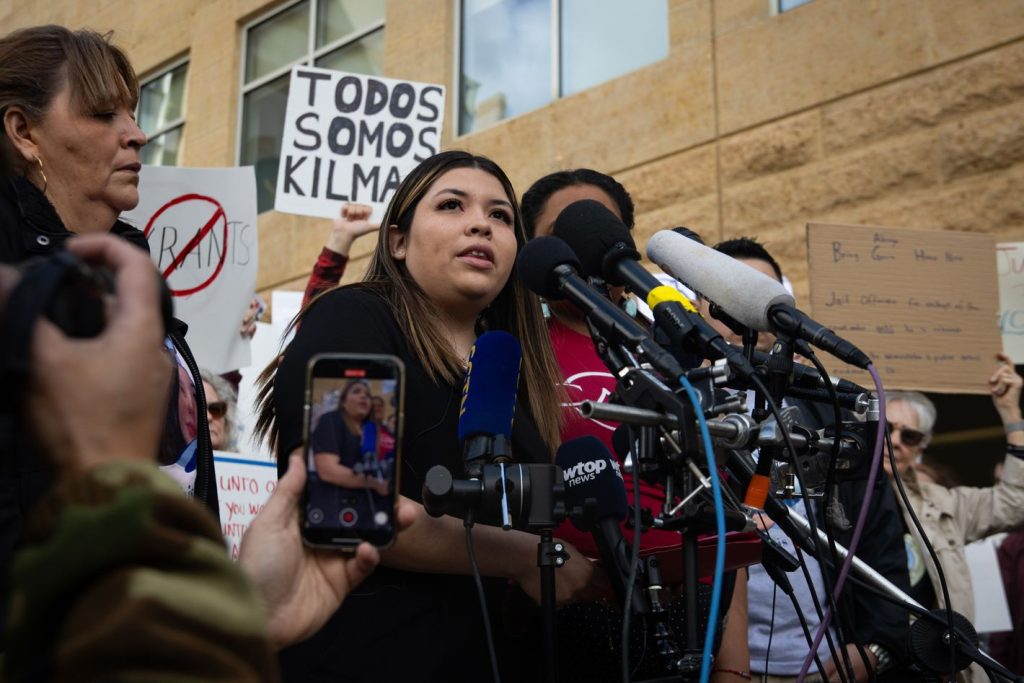Photo: Maansi Srivastava/The Washington Post/Getty Images
It has been two months since Kilmar Abrego Garcia, a Maryland resident, was arrested by federal immigration agents and deported to a notorious maximum-security prison in El Salvador despite his protected legal status. In the weeks since, the Trump administration has continued to push back against an order from the U.S. Supreme Court to “facilitate” Abrego Garcia’s return, claiming — unconvincingly — that it lacks the authority to do so. Top officials have also said that if Abrego Garcia were to come back, he would simply be deported again.
Abrego Garcia was last seen in public in a photo from an April meeting with Maryland senator Chris Van Hollen, a staunch advocate for his return who traveled to El Salvador with the intent of assessing his well-being. Van Hollen said he learned that Abrego Garcia was initially held at the infamous CECOT prison but was later transferred to a different facility, which still lacked access to the outside world.
As the federal government continues to fight its position in the lower courts, here’s where things stand with Abrego Garcia’s case.
Where does the case stand?
In April, U.S. District Judge Paula Xinis, a federal judge in Maryland, ruled that Abrego Garcia’s deportation was illegal and set a short deadline for the federal government to “facilitate” for his return to the United States. The Trump administration appealed the ruling and sought to raise the matter to the Supreme Court, likely seeking a more favorable outcome. However, the nation’s highest court ruled that Abrego Garcia had been “improperly sent” to El Salvador and upheld Xinis’s ruling.
After the Supreme Court weighed in, Xinis ordered that the government provide daily reports on the steps it is taking to bring Abrego Garcia back. The judge has taken the Trump administration to task for its apparent lack of action on that front, ordering the government to provide evidence and undergo depositions on what officials have done to work to secure Abrego Garcia’s return.
The Associated Press reports that, in recent days, the government has invoked the state secrets privilege to avoid answering questions regarding Abrego Garcia’s deportation and potential return. In a Monday court filing, Abrego Garcia’s attorneys noted that it has been a month since the Supreme Court issued its ruling, “yet Abrego Garcia remains in El Salvador, and the Government has produced no evidence showing that it has made the slightest effort to facilitate his release.” Both sides are set to appear for a hearing in Maryland this week.
What has the federal government said?
In court, the federal government has claimed that it lacks the authority to order a foreign nation to release someone it has detained, a position echoed by Salvadoran president Nayib Bukele, who made it clear that his government has no immediate plans to assist with Abrego Garcia’s return.
But in a rush to defend Abrego Garcia’s deportation, federal officials have frequently contradicted the official party line on the issue. Stephen Miller, a Homeland Security adviser to Trump, has stated numerous times that Abrego Garcia’s removal was not an error, despite the Justice Department’s initial assertions in court filings. “This was the right person sent to the right place,” he said in a Fox News interview in April. In an ABC News interview, President Trump appeared to agree with a reporter’s suggestion that he could have Abrego Garcia back on U.S. soil if he wanted to.
Throughout the legal fight, the Trump administration has sought to influence public opinion on Abrego Garcia, publishing law-enforcement documents claiming to show evidence of his gang ties as well as publicizing a years-old order of protection sought by Abrego Garcia’s now-wife, Jennifer Vasquez Sura, who has played a central role in the push for his return.
During her testimony before a Senate committee last week, Homeland Security secretary Kristi Noem was blunt about the prospects of Abrego Garcia’s return to the United States. “There is no scenario where Abrego Garcia will be in the United States again. If he were to come back, we would immediately deport him again,” she said.
What might happen next?
Abrego Garcia’s future likely hinges on the outcome of the Trump administration’s ongoing fight with the courts. Judge Xinis has signaled an openness to holding the government in contempt, claiming that officials have failed to provide requested evidence and have taken no meaningful steps toward aiding his return. However, the administration, which has taken a combative approach toward the judiciary writ large, has given no indication that it would comply with any future legal orders, likely setting the stage for an unprecedented constitutional crisis.
Elie Honig, a former federal prosecutor, raised numerous scenarios in an article for Intelligencer, concluding that it’s unlikely that Abrego Garcia will return to the United States to stay for good. Honig engaged with a possibility given by Trump officials — the potential return of Abrego Garcia and immediate re-deportation:
A core problem for Abrego Garcia is that he lacks legal status in the U.S. beyond the withholding order that provides he can’t be deported to El Salvador. He’s neither a visa holder nor a legal permanent resident nor a U.S. citizen.
Thus, if the administration eventually concludes that a prolonged showdown in the courts will inflict unsustainable political costs, it could make a practical move to end the legal battle: It could bring Abrego Garcia back to the U.S. and immediately begin the process of deporting him to any country other than El Salvador. Abrego Garcia’s legal team would surely challenge his ongoing detention and would argue that the administration has offered no substantive evidence of gang ties or criminality. But the cold reality for Abrego Garcia is that he can be deported even without evidence of criminality or other wrongdoing.

